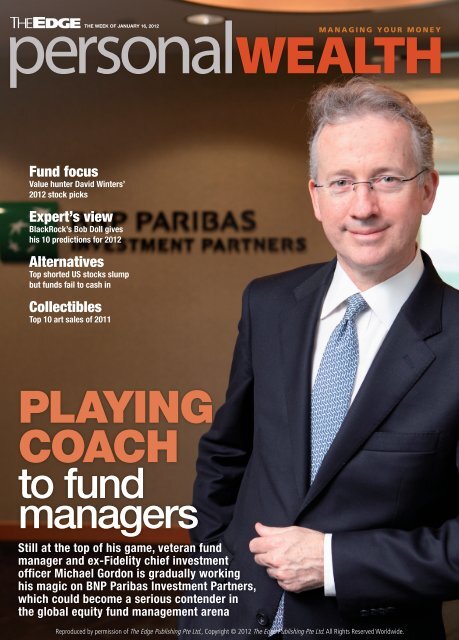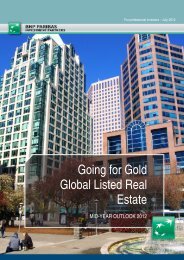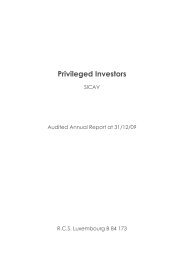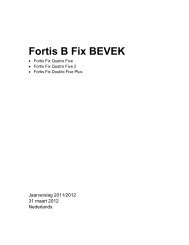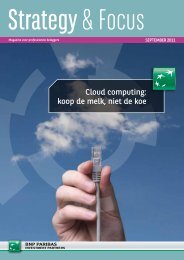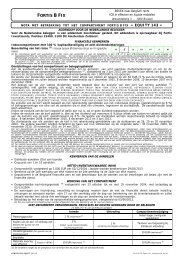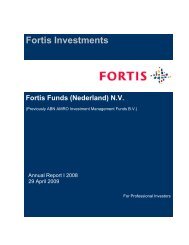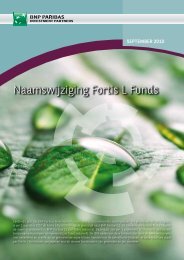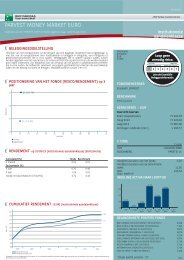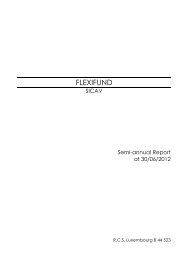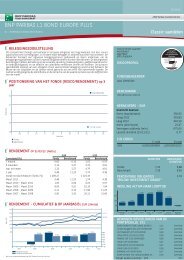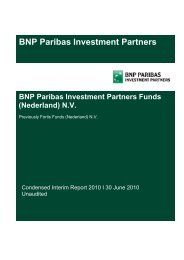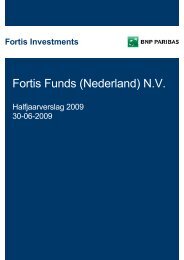Fund focus Expert's view Alternatives Collectibles - BNP Paribas ...
Fund focus Expert's view Alternatives Collectibles - BNP Paribas ...
Fund focus Expert's view Alternatives Collectibles - BNP Paribas ...
Create successful ePaper yourself
Turn your PDF publications into a flip-book with our unique Google optimized e-Paper software.
THE WEEK OF JANUARY 16, 2012<br />
M A N A G I N G Y O U R M O N E Y<br />
personalWEALTH<br />
<strong>Fund</strong> <strong>focus</strong><br />
Value hunter David Winters’<br />
2012 stock picks<br />
Expert’s <strong>view</strong><br />
BlackRock’s Bob Doll gives<br />
his 10 predictions for 2012<br />
<strong>Alternatives</strong><br />
Top shorted US stocks slump<br />
but funds fail to cash in<br />
<strong>Collectibles</strong><br />
Top 10 art sales of 2011<br />
PLAYING<br />
COACH<br />
to fund<br />
managers<br />
Still at the top of his game, veteran fund<br />
manager and ex-Fidelity chief investment<br />
officer Michael Gordon is gradually working<br />
his magic on <strong>BNP</strong> <strong>Paribas</strong> Investment Partners,<br />
which could become a serious contender in<br />
the global equity fund management arena<br />
Reproduced by permission of The Edge Publishing Pte Ltd., Copyright © 2012 The Edge Publishing Pte Ltd. All Rights Reserved Worldwide.
PW4 • THEEDGE SINGAPORE | JANUARY 16, 2012<br />
PERSONAL WEALTH<br />
COVERSTORY<br />
Gordon: Success takes a number of years. But in my judgement,<br />
I am very happy to be where we are right now.<br />
SAMUEL ISAAC CHUA/THE EDGE SINGAPORE<br />
PLAYING COACH<br />
to fund managers<br />
Still at the top of his game, veteran fund manager and ex-Fidelity chief investment officer<br />
Michael Gordon is gradually working his magic on <strong>BNP</strong> <strong>Paribas</strong> Investment Partners, which<br />
could become a serious contender in the global equity fund management arena<br />
2002 to 2005 and helped build the Asia team<br />
at Fidelity. I also had a very interesting time<br />
running fixed income [as acting head of fixed<br />
income at Fidelity] when the Asian financial<br />
crisis hit in 2007. That was great. Beyond that,<br />
it wasn’t that challenging,” says Gordon.<br />
A possible disagreement with the top management<br />
at Fidelity also contributed to his resignation<br />
in late 2009, when he left without a<br />
job. “When I was in London as global CIO at<br />
Fidelity, I felt that we needed to make some<br />
changes in structuring the UK team and I proposed<br />
one or two things. But they were not<br />
accepted,” he reveals. It wasn’t the first time<br />
Gordon left a big fund management company<br />
after losing interest in his job. “Yes, I have<br />
done it before. I left Schroders Australia at the<br />
end of the 1990s. Similarly, I took a break and<br />
Fidelity came calling [in 2000],” says Gordon,<br />
who was once CIO for Australasia at Schroders,<br />
where he spent eight years.<br />
| STORIES BY KELVIN TAN |<br />
In the afternoon of most weekends, whenever<br />
there is a football match at the Emirates<br />
Stadium — home to famous London<br />
club Arsenal — you will find Michael Gordon<br />
at the stands, rooting for his beloved<br />
Gunners. During a recent business trip to Singapore,<br />
the London-based season ticket holder,<br />
who has been an ardent supporter of Arsenal<br />
since 1986, was even planning to watch<br />
an FA Cup Fourth Round match on TV in his<br />
hotel room. The Gunners versus Leeds United<br />
game was shown at 3.45am in Singapore<br />
on early Tuesday morning.<br />
But a jetlagged Gordon could not wake up to<br />
catch the match, which was shown live across<br />
the globe owing to the possible involvement of<br />
legendary striker Thierry Henry, who rejoined<br />
his former club for a two-month stint from<br />
his current team, the New York Red Bulls. “I<br />
overslept and woke up at 6am. But it was too<br />
late to catch the match and I missed Henry’s<br />
goal,” sighs Gordon, during an inter<strong>view</strong> with<br />
Personal Wealth recently. In a fairytale return,<br />
the 34-year-old French striker sent the crowd<br />
at the Emirates into a delirium when he slotted<br />
home the winning goal after coming off<br />
the bench in the second half of the match. Arsenal<br />
won 1-0.<br />
Like Henry, Gordon — a veteran fund manager<br />
with more than 25 years of investment experience<br />
and a former global chief investment<br />
officer (CIO) at Fidelity International — is still<br />
at the very top of his game after having turned<br />
around the equity funds’ performance at <strong>BNP</strong><br />
<strong>Paribas</strong> Investment Partners (<strong>BNP</strong>IP) over the<br />
past 18 months as CIO of equities. “When I<br />
arrived at <strong>BNP</strong>IP [in May 2010], around 46%<br />
of our equity funds outperformed the benchmarks.<br />
Now, the figure is around 60%. It has<br />
certainly improved,” says Gordon, who oversees<br />
roughly US$50 billion in equity assets.<br />
Gordon joined the French asset management<br />
firm shortly after Fortis Investments<br />
was merged into <strong>BNP</strong>IP. He was immediately<br />
tasked to streamline the equity teams at the<br />
combined entity and improve the overall performance<br />
of the asset management house’s<br />
stock funds.<br />
“When Fortis was merged into <strong>BNP</strong>IP, we<br />
had a number of Asian and European equity<br />
teams, with duplications everywhere. We had<br />
a couple of things that were set up in what<br />
I called the old fashion way. [The management]<br />
came to me and said, ‘we really need<br />
to address the problems in the equity teams’.<br />
So, I joined the firm and that was what I have<br />
done,” says Gordon, who resigned from Fidelity<br />
in late 2009, and has since been playing<br />
“coach” to the equity teams at <strong>BNP</strong>IP.<br />
At Fidelity, the 51-year-old Australian held<br />
several key positions during his nine-year stint<br />
at the global fund management firm. He was<br />
global CIO, Asia CIO, acting head of fixed income<br />
and most recently, global head of institutional<br />
investment. Gordon left Fidelity because<br />
he felt it wasn’t challenging during the later<br />
years. “I was in Hong Kong as Asia CIO from<br />
Smaller teams are better<br />
Presently, Gordon seems to be enjoying work<br />
for the French asset management house, which<br />
allows him to express his management philosophy<br />
that <strong>focus</strong>es on smaller and nimbler investment<br />
teams. “The changes we made are<br />
quicker than anticipated. I have been given<br />
greater freedom and trust than I had before,<br />
which is great,” he says.<br />
Among the many things that Gordon has<br />
implemented over the past 1½ years at <strong>BNP</strong>IP<br />
was the restructuring of the firm’s global listed<br />
real-estate group, which used to have teams<br />
with different approaches scattered in the US,<br />
Europe and Asia. “It used to have three centres<br />
in three regions. They put them together and<br />
called it global. I think that was rather an old<br />
fashion way of doing things. So, I shut down<br />
two centres and brought the teams into one<br />
smaller group, sitting in one centre in Amsterdam.<br />
They now work together real time and<br />
making decisions formally and informally, examining<br />
what is driving listed real estate.”<br />
Reproduced by permission of The Edge Publishing Pte Ltd., Copyright © 2012 The Edge Publishing Pte Ltd. All Rights Reserved Worldwide.
THEEDGE SINGAPORE | JANUARY 16, 2012 • PW5<br />
PERSONAL WEALTH<br />
2012 will be a good year for equities, says <strong>BNP</strong>IP’s CIO<br />
The good showing of global equities in<br />
recent weeks suggests that risk aversion<br />
towards stocks is slowly fading away on<br />
the back of robust economic news from the<br />
US and the stabilisation of the European<br />
debt crisis. The next trend will be a strong<br />
short-term rebound in global equities, where<br />
emerging-market equities will outperform<br />
their developed market peers, according to<br />
Michael Gordon, chief investment officer of<br />
equities at <strong>BNP</strong> <strong>Paribas</strong> Investment Partners<br />
(<strong>BNP</strong>IP).<br />
“I am increasingly bullish on equities.<br />
First of all, I feel that equities are extremely<br />
cheap and bonds are looking extremely<br />
expensive on all the long-term valuation<br />
measures. The equity risk premium is<br />
incredibly high. The long-term earnings<br />
forecasts for stocks that people are inputting<br />
from that are actually negative. If you take<br />
the long-term equity risk premium for<br />
European stocks, the market is expecting a<br />
fall of 5.5% in earnings every year forever. It<br />
just seems too bearish.”<br />
Cheap valuations, however, will not be<br />
the sole catalyst for stocks to move higher,<br />
according to Gordon, who feels that positive<br />
US economic data coupled with speculators<br />
getting tired at playing the gloomy European<br />
markets are the other two key factors that<br />
will lead to a strong rally in equities. “People<br />
will get bored looking at Europe and they<br />
will look elsewhere. And if they do, they will<br />
realise that the valuations of stocks around<br />
the world are looking very, very compelling.”<br />
Over the next quarter, there will be a<br />
“risk on” type of environment, where risky<br />
assets would outperform the safe haven<br />
ones. “That means emerging equities will do<br />
better than developed equities. It also means<br />
higher-beta plays will do better than lowerbeta<br />
plays in the interim,” says Gordon.<br />
Beyond that, Gordon will look for further<br />
proof of a sustainable bull run. “I am more<br />
confident of predicting a short-term bounce<br />
than forecasting things to get better over<br />
the long run,” he says. Assuming that global<br />
equities rebound 10% to 15% over the next<br />
three months and if gold doesn’t participate<br />
in that rally, then Gordon says he will be<br />
“more encouraged” with regards to the<br />
sustainability of the stock market rally. If<br />
global investors are leaving the safe haven<br />
assets for riskier investments, then that will<br />
be a clear sign of more good things to come<br />
for equities, he says. If there is a sharp bounce<br />
in the equity market without gold, then he<br />
feels that the high-quality companies such<br />
as the global MNCs will be the next group of<br />
stocks after emerging equities to feed on the<br />
on-going rally.<br />
“I would be buying high-quality<br />
developed market companies, especially<br />
those that are benefiting from the growth in<br />
emerging economies. There is a case to be<br />
made for some developed-market companies<br />
that are making more money out from<br />
the emerging economies than developing<br />
-market companies,” says Gordon who is<br />
bullish on large, well known MNCs such as<br />
Apple, Nestlé and McDonald’s, which<br />
will continue to do well in terms of profits<br />
and revenues, given the growth of emerging<br />
markets.<br />
“Apple is a good example. You take<br />
Apple and HTC. It is classic American<br />
[capitalism] at work. Apple is very strong,<br />
very powerful, despite the emergence of<br />
many new competitors. Apple is basically<br />
crushing them, except for Samsung to<br />
be fair. You also got the consumer goods<br />
companies such as Nestlé, with good, solid<br />
reliable earnings. Over the last 40 years, it<br />
has never had a negative revenue year. It<br />
has many products that benefit from the<br />
growth of emerging economies. It is fairly<br />
amazing,” he says.<br />
Although many fund houses and private<br />
banks are still recommending defensive,<br />
high dividend-yielding stocks as safer equity<br />
plays for 2012, given the extreme volatility<br />
of last year, Gordon cautions that such<br />
counters, which generally fail to capture<br />
the upside of a strong bull rally, could<br />
underperform this year. “The argument that<br />
those people made, which I agree with, is<br />
that over the long run, dividends make up<br />
a far greater component of total returns.<br />
And they are right. If you are going to take<br />
a five- to 10-year <strong>view</strong>, yes, high dividendyielding<br />
stocks are the place to be.” But<br />
over the next three to six months, they may<br />
underperform the high-beta or economicsensitive<br />
counters, he says. “When we have<br />
a risk-on rally, high dividend-yielding stocks<br />
are likely to underperform. You don’t bet on<br />
dividend stocks in a strong rally, you invest<br />
in dividend stocks for the long term.”<br />
Overall, global equities, which slumped<br />
7.6% last year (measured by the MSCI<br />
World Index), could turn in double-digit<br />
returns in 2012, according to the bullish CIO,<br />
who likes US stocks and shares of global<br />
MNCs as an emerging-market play.<br />
Customers look at Apple Inc’s iPad2 tablet computers at a Best Buy<br />
Co store in San Francisco. Apple is one of the global MNCs that are<br />
benefiting from the growth of emerging economies, says Gordon.<br />
PICTURES: BLOOMBERG<br />
Gordon also did away with the “extremely<br />
bottom-up <strong>focus</strong>ed investment approach”<br />
of his global listed real-estate team, turning it<br />
into a more “top-down” <strong>focus</strong>ed one. For listed<br />
real estate, macro factors are the ones that<br />
influence the investment opportunities, he<br />
adds. “It is macro, country and sector factors<br />
[that drive returns].”<br />
Nonetheless, the CIO says he brings no “preconceived<br />
investment style <strong>view</strong>s or biases” to<br />
his equity investment teams, which are largely<br />
run independently. “If we look at the setup that<br />
we have, we have a set of investment teams that<br />
is autonomous. We don’t have a house <strong>view</strong> on<br />
a stock, sector or a market. Every team exists<br />
in its own right. It has a head of the team, with<br />
fund managers and research analysts. It exists<br />
on an autonomous basis. But it must have a<br />
valid investment philosophy and a process that<br />
works with that philosophy. It is working with<br />
a collection of boutiques within my parameter,”<br />
says Gordon. “There is no overriding philosophy.<br />
It is whatever works for that group.”<br />
Still, the heads of the <strong>BNP</strong>IP equity teams<br />
will have to report to Gordon, who periodically<br />
challenges them about their investment<br />
philosophies and processes. “I work only with<br />
the teams with regard to their philosophies<br />
and processes. I don’t want to go into any<br />
group and say, you should increase the beta of<br />
your funds or underweight this and that sector.<br />
What I would ask them is to explain to<br />
me their philosophies and how the processes<br />
come up with the stocks.”<br />
A keen admirer of Arsenal coach and manager<br />
Arsene Wenger, Gordon says the role<br />
he plays at <strong>BNP</strong>IP is like coach of a football<br />
team who has no control over the outcome<br />
of a match. “You pick the team, you have the<br />
strategy, and you send them out to play. Once<br />
they get on the field, they have to stick to the<br />
plan. If they don’t or try something different,<br />
you have to tell them at the end of the match<br />
what went wrong and say ‘guys, we must<br />
stick to the plan’,” says the CIO who finds the<br />
management of fund management teams and<br />
people to be more interesting compared with<br />
managing money.<br />
His game plan and management style have<br />
been successful over the past 1½ years, given<br />
that more than 60% of all equity funds at BN-<br />
PIP are currently outperforming their benchmarks<br />
on a three-year basis, compared with<br />
just 46% when he first arrived, according to<br />
Gordon’s estimates. Still, there is room for improvement,<br />
adds Gordon, who wants to push<br />
the three-year outperformance numbers of his<br />
equity funds to be around 66%. “The goal is<br />
66%, as it was at Fidelity. We should be able<br />
to do that. At the moment, we are still a bit behind<br />
that,” he admits. “Success takes a number<br />
of years. But in my judgement, I am very happy<br />
to be where we are right now.”<br />
Beating the benchmark<br />
Having seen numerous bulls and bear cycles<br />
over the past 2½ decades, Gordon is sensing<br />
that global equities could make a strong<br />
rebound over the next three months, and is<br />
advising his equity teams not to shun highbeta<br />
stocks to avoid underperforming the<br />
benchmarks.<br />
Cheap equity valuations, positive economic<br />
data from the US and the recent containment<br />
of the sovereign crisis in Europe by policymakers<br />
in the eurozone could easily spark a strong<br />
rally in global equities, he says. “We may see a<br />
sharp rally quite quickly. Valuations are compelling<br />
for equities. Certainly, the news out<br />
of the US is increasingly positive, and people<br />
will start to pay more attention to that. But I<br />
think the catalyst that would swing the market<br />
higher is that investors are getting a little<br />
bit bored with the situation in Europe. I am<br />
not saying that the crisis in Europe is going<br />
away, but I suspect it may not get any worse<br />
and that will be enough for [investors] to look<br />
Traders at the New York Stock Exchange. Gordon is bullish on US equities, which he feels will outperform<br />
those of Europe and Japan this year.<br />
somewhere else,” says the bullish Gordon, who<br />
reckons that global equities could turn in double-digit<br />
returns this year after last year’s tumble.<br />
(See story above for more of Gordon’s investment<br />
<strong>view</strong>s.)<br />
That’s why he is cautioning his fund managers<br />
against taking an ultra defensive approach<br />
to stock picking, especially over the<br />
next three months, which could see a broadbase<br />
rally in both good and bad stocks. “For<br />
me, the only point I am making with my teams<br />
is for them to be aware of the risk inherent in<br />
what they don’t own. There are a lot of things<br />
such as high beta stocks that could bounce<br />
up quite sharply over the next few weeks and<br />
that could harm their portfolios in the relative<br />
sense if they don’t own them,” he tells<br />
Personal Wealth.<br />
Gordon, however, says he will not force<br />
his managers to buy trash stocks in order to<br />
boost their short-term performance. “I just<br />
want my fund managers to be aware of that<br />
risk of underperformance as a result of not<br />
owning those high-beta stocks. I am not telling<br />
them to do anything but I would remind<br />
them to address that issue. If they looked at<br />
it and say they just couldn’t buy those highbeta<br />
stocks because they are rubbish companies,<br />
then it is fine.”<br />
The optimistic Gordon, who is part of BN-<br />
PIP’s asset allocation committee representing<br />
the voice of his equity fund managers,<br />
reckons that the positive performance of global<br />
equities during the start of the year will<br />
likely gather steam in the weeks ahead. “The<br />
strong rally is already happening now. It is<br />
the nature of the market that rallies happen<br />
quite quickly. It will happen more quickly<br />
than what most people would anticipate,”<br />
says Gordon, who is equally sanguine about<br />
the match performance of Arsenal over the<br />
next two months, especially with the talismanic<br />
Henry back at the club. “For sure, I<br />
wouldn’t miss another Henry goal over the<br />
next couple of matches,” he quips.<br />
E<br />
Reproduced by permission of The Edge Publishing Pte Ltd., Copyright © 2012 The Edge Publishing Pte Ltd. All Rights Reserved Worldwide.


